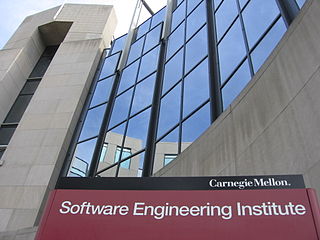Related Research Articles

Software Engineering Institute (SEI) is a federally funded research and development center in Pittsburgh, Pennsylvania, United States. Founded in 1984, the institute is now sponsored by the United States Department of Defense and the Office of the Under Secretary of Defense for Research and Engineering, and administrated by Carnegie Mellon University. The activities of the institute cover cybersecurity, software assurance, software engineering and acquisition, and component capabilities critical to the United States Department of Defense.

Carnegie Mellon University (CMU) is a private research university in Pittsburgh, Pennsylvania. The institution was originally established in 1900 by Andrew Carnegie as the Carnegie Technical Schools. In 1912, it became the Carnegie Institute of Technology and began granting four-year degrees. In 1967, it became the current-day Carnegie Mellon University through its merger with the Mellon Institute of Industrial Research, founded in 1913 by Andrew Mellon and Richard B. Mellon and formerly a part of the University of Pittsburgh.

The Heinz College of Information Systems and Public Policy, also known as Heinz College, is the public policy and information college of Carnegie Mellon University in Pittsburgh, Pennsylvania. It consists of the School of Information Systems and Management and the School of Public Policy and Management. The college is named after CMU's former instructor and the later U.S. Senator John Heinz from Pennsylvania.

The School of Computer Science (SCS) at Carnegie Mellon University in Pittsburgh, Pennsylvania, US is a school for computer science established in 1988. It has been consistently ranked among the top computer science programs over the decades. As of 2022 U.S. News & World Report ranks the graduate program as tied for second with Stanford University and University of California, Berkeley. It is ranked second in the United States on Computer Science Open Rankings, which combines scores from multiple independent rankings.

The National University of Sciences & Technology (NUST) is a multi-campus public research university with its main campus in Islamabad, Pakistan.

Dakota State University (DSU) is a public university in Madison, South Dakota. The school was founded in 1881 as a normal school, or teacher training school. Education is still the university's heritage mission, but a signature mission of technology was added by the state legislature in 1984 to specialize in "programs in computer management, computer information systems, and other related undergraduate and graduate programs."

The University of Nebraska Omaha is a public research university the central United States, located in Omaha, Nebraska. Founded in 1908 by faculty from the Omaha Presbyterian Theological Seminary as a private non-sectarian college, the university was originally known as the University of Omaha. Originally meant to provide a Christian-based education free from ecclesiastical control, the university served as a strong alternative to the city's many successful religiously affiliated institutions.

Carnegie Mellon Silicon Valley is a degree-granting branch campus of Carnegie Mellon University located in the heart of Silicon Valley in Mountain View, California. It was established in 2002 at the NASA Ames Research Center in Moffett Field.
The Department of Social and Decision Sciences (SDS) is an interdisciplinary academic department within the Dietrich College of Humanities and Social Sciences at Carnegie Mellon University. The Department of Social and Decision Sciences is headquartered in Porter Hall in Pittsburgh, Pennsylvania and is led by Department Head Gretchen Chapman. SDS has a world-class reputation for research and education programs in decision-making in public policy, economics, management, and the behavioral social sciences.

The B. Thomas Golisano College of Computing and Information Sciences is one of the largest colleges at the Rochester Institute of Technology (RIT), and is home to the institute's computing education and research facilities. Golisano College is home to RIT's computer science, cybersecurity, information sciences and technologies, and software engineering departments, and to the Ph.D. program in computing and information sciences, and the School of Interactive Games & Media. Golisano College is housed in a 125,000 square foot facility, opened in 2003 on RIT's campus in Rochester, New York. In 2020, the facility added an additional 52,000 square foot building, which joins the original Golisano College on all three floors and houses the ESL Global Cybersecurity Institute.

The CERT Coordination Center (CERT/CC) is the coordination center of the computer emergency response team (CERT) for the Software Engineering Institute (SEI), a non-profit United States federally funded research and development center. The CERT/CC researches software bugs that impact software and internet security, publishes research and information on its findings, and works with businesses and the government to improve the security of software and the internet as a whole.
MySecureCyberspace began in 2003 as an initiative by Carnegie Mellon CyLab and the Information Networking Institute to educate the public about computer security, network security and Internet safety. Inspired by the National Strategy to Secure Cyberspace, the initiative empowers users to secure their part of cyberspace.

The Khoury College of Computer Sciences is the computer science school of Northeastern University in Boston, Massachusetts. It was the first college in the United States dedicated to the field of computer science when it was founded in 1982. In addition to computer science, it specializes in data science and cybersecurity. The college was also among the first to offer an information assurance degree program.

The Center for Education and Research in Information Assurance and Security (CERIAS) of Purdue University, United States, is a center for research and education in areas of information security for computing and communication infrastructures.
The Tepper School of Business is the business school of Carnegie Mellon University. It is located in the university's 140-acre (0.57 km2) campus in Pittsburgh, Pennsylvania.

Kiron Kanina Skinner is a former Director of Policy Planning at the United States Department of State in the Trump administration. Skinner is presently the Taube Professor of International Relations and Politics at the Pepperdine University School of Public Policy, where she teaches graduate courses in national security and public leadership. Prior to that, she was the Taube Professor of International Relations and Politics at Carnegie Mellon University, and the founding director of the Institute for Politics and Strategy and associated centers at the university. She is also the W. Glenn Campbell Research Fellow at the Hoover Institution. After leaving the Department of State, she returned to her position at Carnegie Mellon University until stepping down in 2021.
Angel G. Jordan was a Spanish-born American electronics and computer engineer known as the founder of the Software Engineering Institute (SEI) and co-founder of the Robotics Institute at Carnegie Mellon University (CMU) and served on its faculty for 55 years, since 2003 as Emeritus. He was instrumental in the formation of the School of Computer Science (SCS) at Carnegie Mellon. He has made contributions to technology transfer and institutional development. He served as Dean of Carnegie Mellon College of Engineering and later as the provost of Carnegie Mellon University.
The Carnegie Mellon CyLab Security and Privacy Institute is a computer security research center at Carnegie Mellon University. Founded in 2003 as a university-wide research center, it involves more than 50 faculty and 100 graduate students from different departments and schools within the university. It is "one of the largest university-based cyber security research and education centers in the U.S."

Hideto Tomabechi is a Japanese cognitive scientist computer scientist.
Nancy Rose Mead is an American computer scientist. She is known for her contributions to security, software engineering education and requirements.
References
- ↑ "About the INI". Carnegie Mellon's Information Networking Institute. Retrieved 2008-04-17.
- ↑ "About CyLab". Carnegie Mellon CyLab. Retrieved 2013-06-10.
- ↑ "About the INI". Carnegie Mellon's Information Networking Institute. Retrieved 2013-04-04.
